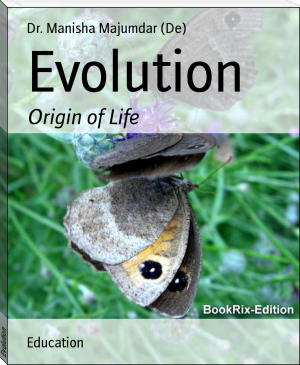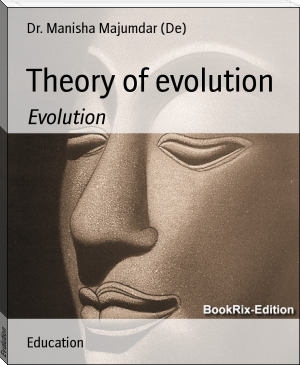Freedom in Science and Teaching by Ernst Haeckel, T. H. Huxley (well read books TXT) 📕

Read free book «Freedom in Science and Teaching by Ernst Haeckel, T. H. Huxley (well read books TXT) 📕» - read online or download for free at americanlibrarybooks.com
- Author: Ernst Haeckel, T. H. Huxley
Read book online «Freedom in Science and Teaching by Ernst Haeckel, T. H. Huxley (well read books TXT) 📕». Author - Ernst Haeckel, T. H. Huxley
While this unheard-of demand sets Virchow's views of teaching in the most extraordinary light, and while every unprejudiced and experienced teacher must most emphatically protest against this strait-waistcoat for instruction, he will feel no less bound to resist Virchow's other strange demand, that every ascertained truth shall forthwith be taught in all schools, down to the elementary schools. I myself, in my Munich address, sought the instructional value of our monistic evolution theory above all in the genetic method, in the inquiry, that is to say, for the effective causes of the facts taught; and I added these words--"How far the principles of the doctrine of universal evolution ought to be at once introduced into our schools, and in what succession its most important branches ought to be taught in the different classes--cosmogony, geology, the phylogenesis of animals and plants, and anthropology--this we must leave to practical teachers to settle. But we believe that an extensive reform of instruction in this direction is inevitable, and will be crowned by the fairest results." I purposely avoided any closer discussion of this specialist question, as I felt not even approximately capable of solving it, and I believe, in fact, that none but skilled and experienced practical teachers can undertake the solution of it with any success.
For Virchow these specialist difficulties seem not to exist; he regards my reticence as a mere "postponement of the task," and he answers in the following astonishing sentences:--"If the theory of descent is as certain as Herr Haeckel assumes, then we must demand--for it is a necessary consequence--that it shall be taught in schools. How is it conceivable that a doctrine of such importance, which must effect such a total revolution in all our mental consciousness, which directly tends to create a new kind of religion, should not be included in the school scheme of instruction? How is it possible that such a--revelation, shall I say--should be in any measure suppressed, or that the promulgation of the greatest and most important advance which has been made in our views during the present century should be left to the discretion of schoolmasters? Ay, gentlemen, that would indeed be a renunciation of the hardest kind, and practically it could never be carried out! Every schoolmaster who assumes this doctrine for himself will involuntarily teach it, how can it be otherwise?"
I must here be permitted to take Virchow exactly at his word. I endorse almost all that he has said in these and the following sentences. The only difference in our views is this, that Virchow regards the theory of descent as an unproved and unproveable hypothesis; I, on the contrary, as a fully established and indispensable theory. How then will it be if the teachers of whom Virchow speaks agree with my views, if--apart, of course, from all special theories of descent--they, like me, consider the general theory of descent as the indispensable basis of all biological teaching? And that that is actually the case Virchow may easily convince himself if he looks over the recent literature of zoology and botany! Our whole morphological literature in particular is already so deeply and completely penetrated by the doctrine of descent, phylogenetic principles already prevail so universally as a certain and indispensable instrument of inquiry, that no man for the future would deprive himself of their help. As Oscar Schmidt justly observes--"Perhaps ninety-nine per cent. of all living, or rather of all working zoologists, are convinced by inductive methods of the truth of the doctrine of descent." And Virchow with his magisterial requirements will attain only the very reverse of what he aims at. How often has it not been said already that science must either have perfect freedom or else none at all? This is as true of teaching as it is of inquiry, for the two are intrinsically and inseparably connected. And so it is not in vain that it is written in section 152 of the German Code, and in section 20 of the Prussian Charter, "Science and her teaching shall be free!"
CHAPTER VI(THE DOCTRINE OF DESCENT AND SOCIAL DEMOCRACY)
Every great and comprehensive theory which affects the foundations of human science, and which, consequently, influences the systems of philosophy, will, in the first place, not only further our theoretical views of the universe, but will also react on practical philosophy, ethics, and the correlated provinces of religion and politics. In my paper read at Munich I only briefly pointed out the happy results which, in my opinion, the modern doctrine of evolution will entail when the true, natural religion, founded on reason, takes the place of the dogmatic religion of the Church, and its leading principle derives the human sense of duty from the social instincts of animals.
The references to the social instincts which I, in common with Darwin and many others, regard as the proper source and origin of all moral development, appear to have afforded Virchow an opportunity in his reply for designating the doctrine of inheritance as a "socialist theory," and for attributing to it the most dangerous and objectionable character which, at the present time, any political theory can have; and these startling denunciations so soon as they were known called forth such just indignation and such comprehensive refutation that I might very properly pass them over here. Still we must at least shortly examine them, in so far as they supply a further proof that Virchow is unacquainted with the most important principles of the development-theory of the day, and therefore is incompetent to judge it. Moreover, Virchow, as a politician, manifestly attributed special importance to this political application of his paper, for he gave it the title, which otherwise would have been hardly suitable, of "The Freedom of Science in the Modern Polity." Unfortunately he forgot to add to this title the two words in which the special tendency of his discourse culminates; the two pregnant words, "must cease!"
The surprising disclosures in which Virchow denounces the doctrine of evolution, and particularly the doctrine of descent, as socialist theories and dangerous to the community, run as follows:--"Now, picture to yourself the theory of descent as it already exists in the brain of a socialist. Ay, gentlemen, it may seem laughable to many, but it is in truth very serious, and I only hope that the theory of descent may not entail on us all the horrors which similar theories have actually brought upon neighbouring countries. At all times this theory, if it is logically carried out to the end, has an uncommonly suspicious aspect, and the fact that it has gained the sympathy of socialism has not, it is to be hoped, escaped your notice. We must make that quite clear to ourselves."
On reading this statement, which seems extracted from the Berlin "Kreuz-Zeitung," or the Vienna "Vaterland," I ask myself in surprise, "What in the world has the doctrine of descent to do with socialism?" It has already been abundantly proved on many sides, and long since, that these two theories are about as compatible as fire and water. Oscar Schmidt might with justice retort, "If the socialists would think clearly they would feel that they must do all they can to choke the doctrine of descent, for it declares with express distinctness that socialist ideas are impracticable." And he proceeds to add, "And why has not Virchow made the gentle doctrines of Christianity responsible for the excesses of socialism? That would have had some sense. His denunciation flung so mysteriously and so confidently before the great public, as though it concerned 'a sure and attested scientific truth,' is, at the same time, so hollow that it cannot be brought into harmony with the dignity of science."
With all these empty accusations, as with all the empty reproaches and groundless objections which Virchow brings against the doctrine of evolution, he takes good care in no way to touch the kernel of the matter. How, indeed, would it have been possible without arriving at conclusions wholly opposed to those which he has declared? For the theory of descent proclaims more clearly than any other scientific theory, that that equality of individuals which socialism strives after is an impossibility, that it stands, in fact, in irreconcilable contradiction to the inevitable inequality of individuals which actually and everywhere subsists. Socialism demands equal rights, equal duties, equal possessions, equal enjoyments for every citizen alike; the theory of descent proves, in exact opposition to this, that the realisation of this demand is a pure impossibility, and that in the constitutionally organised communities of men, as of the lower animals, neither rights nor duties, neither possessions nor enjoyments have ever been equal for all the members alike nor ever can be. Throughout the evolutionist theory, as in its biological branch, the theory of descent--the great law of specialisation or differentiation--teaches us that a multiplicity of phenomena is developed from original unity, heterogeneity from original similarity, and the composite organism from original simplicity. The conditions of existence are dissimilar for each individual from the beginning of its existence; even the inherited qualities, the natural "disposition," are more





Comments (0)